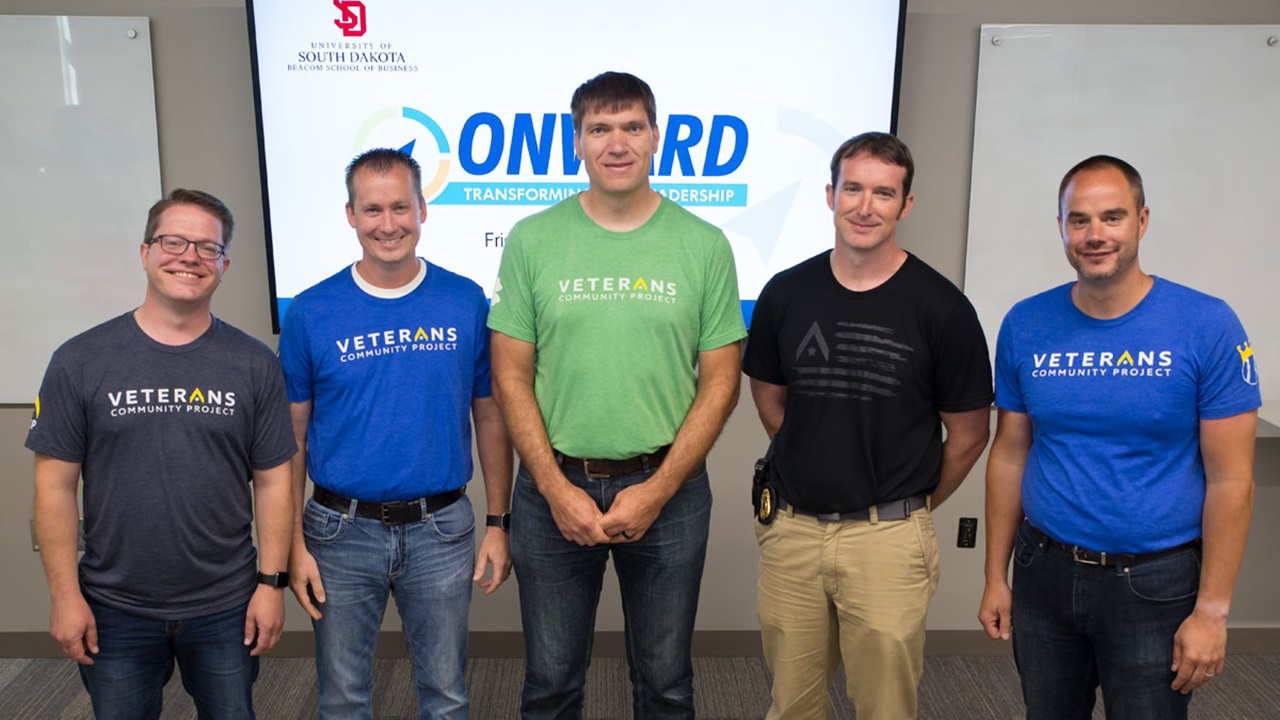Beacom Executive Education Program Leads to New Homes for Veterans

Jason Bieber, senior planner for the City of Sioux Falls, was in one of the first groups of 15 students in the city’s inaugural ONWARD Executive Education Program in 2019. Beacom faculty designed this leadership-development course based around a project and asked each student to propose an idea that would solve a need in their community. Bieber’s suggestion -- helping homeless veterans -- became one of three projects chosen by the class.
“It started out as a feasibility study to construct tiny homes for the homeless,” Bieber said.
After meeting the co-founders of the original Veterans Community Project in Kansas City at a housing summit in Sioux Falls, the ONWARD students’ project evolved into focusing on homeless veterans and creating a Veterans Community Project in northwest Sioux Falls. This village of homes will include on-site support services designed to help veterans return to a stable and independent life.
Bieber said his team’s work that led to this summer’s groundbreaking would have been difficult without the structure of the executive education program and the expertise provided by the Beacom faculty involved.
“Each month we had a different instructor who was an expert in their field,” he said. “It was amazing to utilize this teaching from some of the smartest people you have ever met and take that back to our project and our day-to-day jobs.”
Ryan Sage, assistant city attorney, was another ONWARD participant who worked on the project. “When Jason pitched this, there were a lot of us who were excited to see how we could make an impact on a lot of people who sacrificed tremendously for our country and for the freedoms that we enjoy,” he said.
Over the course of February through July 2019, Bieber, Sage and team members Jim David, chief of legislation and policy, Shannon Verhey, assistant city engineer, and Jon Thum, police chief, gathered information and mustered support from city departments to move the project forward.
“It turned into more of what can the city do to deploy this idea fast?” Bieber said. “Where do we have a piece of land? Where do we have infrastructure? It was great working with not just my team, but the different city departments on getting that land purchased and some housing funds to construct the road out in front.”
Beacom professors offered expert guidance to the students during their monthly day-long meetings while also teaching about topics such as problem solving, change management and decision making, collaboration and teamwork, innovation, and motivating others.
The faculty members challenged and inspired the students as they worked through the six-month program.
“We had homework before class,” said Sage. “It was master’s level content and the faculty drove us at a high level, which was why we were there.”
The group also credits the Beacom faculty with helping them overcome setbacks and work through project roadblocks.
“I’m trying to count how many times we thought our project died,” Sage said. “It was always resurrected by working with the faculty to troubleshoot some challenge. The project was successful in the end in large part because of that knowledge and input the faculty provided us.”
Beacom Faculty Bring Their Expertise to Working Professionals
Beacom faculty members Mark Yockey, Ph.D., interim dean, Jewel Goodman Shepherd, Ph.D., associate dean of graduate programs and associate professor of health services administration, and Chet Barney, Ph.D., associate professor of management, are in their fourth year of teaching executive education to professionals working for the City of Sioux Falls through the city’s ONWARD program.
The city is just one of the groups of businesses and organizations that have participated in the Beacom Executive Education Program, which helps working professionals and senior executives achieve higher productivity and enhance their organization or business’s achievements. Since the program’s initial launch in 2017, the program has trained more than 650 business professionals in the state, region and beyond.
The Beacom Executive Education Program offers instruction in a wide range of topics taught by professors who are authorities on these subjects.
“Anyone can open up a ‘leadership academy’ in any strip-mall, yet to have recognized faculty members from the leading accredited business school in the region teach and lead these executive education sessions brings in a wealth of knowledge and expertise to the programs,” said Yockey.
In the ONWARD Executive Education program for City of Sioux Falls executives, participants are assigned to interdepartmental teams and given an issue to explore. Applying the concepts, techniques and material provided by the Beacom faculty, the students develop immediate and innovative solutions to the problems they’ve identified.
“The sessions provide a roadmap for performing feasibility studies, reviewing existing literature, and managing complex change,” said Goodman Shepherd. “The Beacom faculty have years of experience in academia and industry and provide a unique approach to educating working professionals on better meeting the needs of the citizens they serve.”
City of Sioux Falls employees saw a need for homeless citizens who are often at the outskirts of society and used their time and energy to create a solution to house and support veterans, who represent a disproportionate segment of the total homeless population in the United States. Beacom faculty members praise the executives who used their time in the program to solve this challenging problem.
“The tiny homes project is a prime example of how the City of Sioux Falls is working diligently to enhance employees’ knowledge and ability to work collectively to recognize challenges, strategize and make more informed decisions,” said Barney.
Without the structure of the ONWARD Executive Education Program and Beacom faculty support, Bieber wonders whether the Veterans Community Project would have become a reality.
“When you’re busy doing your day-to-day job, you don’t often have an opportunity to carve out time to really think about how to solve a big problem,” said Bieber. “The ONWARD program forced us to really focus.”

